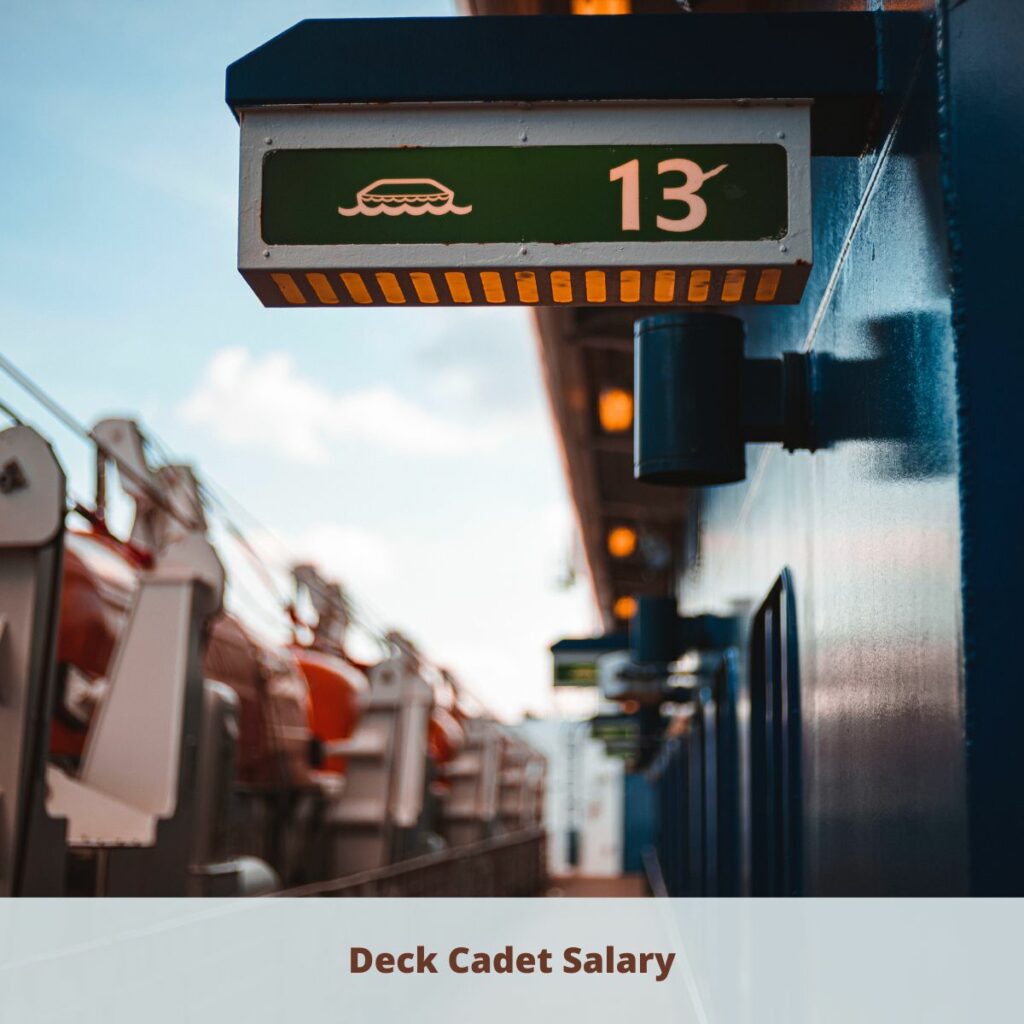Deck Cadet Salary: What You Need to Know
If you're considering a career as a deck cadet, one of the things you may be wondering is how much you can expect to earn. Deck cadets are responsible for helping to maintain the ship's deck and carrying out various duties under the guidance of a senior officer. In this article, we'll take a closer look at deck cadet salary and what factors can affect your earning potential.
What is a Deck Cadet?
Deck cadets are essential members of the crew in the merchant navy. They are aspiring officers who are undergoing training and gaining practical experience to become competent navigators and sailors. They work under the supervision of senior officers and learn the skills and knowledge required to operate and maintain various equipment, machinery, and systems on board.

Deck cadets are responsible for various duties related to the ship's deck, including cleaning and maintaining the deck and its equipment, assisting in loading and unloading cargo, checking the condition of ropes, cables, and chains, and ensuring that safety procedures are followed. They also help with the navigation of the ship, including monitoring the weather conditions, updating charts and publications, and using electronic and mechanical navigational aids.
Deck cadets work in shifts, typically lasting six to eight hours, and must be available to work day or night. They need to be physically fit and have good communication skills, as they often work in teams and interact with different crew members, including engineers, officers, and other cadets. Deck cadets must also follow strict safety protocols and emergency procedures to ensure the safety of themselves, their fellow crew members, and the ship.
Deck cadet salary may vary depending on factors such as the company, type of vessel, location, and level of experience. While the starting salary for a deck cadet may be modest, it can increase as they gain more experience and take on more responsibilities. Deck cadets can also benefit from additional training and certifications that can increase their earning potential and career opportunities.
To become a deck cadet, you typically need a high school diploma and must complete a deck cadet training program accredited by the relevant maritime authority. These programs usually include both classroom instruction and onboard training, allowing cadets to gain practical experience in different aspects of ship operations and management. After completing the training program and acquiring the required certifications and qualifications, deck cadets can advance to more senior positions in the merchant navy, such as third or second officer, and earn higher salaries.
Deck Cadet Salary: How Much Can You Expect to Earn?
Deck cadets play an essential role in the merchant navy and are responsible for a wide range of duties related to the ship's deck and navigation. As with any profession, one of the most important considerations for anyone considering a career as a deck cadet is the potential earning potential. In this article, we will explore the factors that can affect deck cadet salary and provide an overview of what you can expect to earn in this role.
Deck cadet salaries can vary widely depending on a range of factors such as the type of vessel, the company, the location, and the level of experience. Typically, deck cadets can expect to start on a modest salary of around $500 to $1,000 per month. However, as they gain experience and take on more responsibilities, their salaries can increase significantly.
In addition to their base salary, deck cadets may also be eligible for other benefits, such as free accommodation and meals onboard, medical insurance, and travel allowances. The exact benefits available will vary depending on the company and the vessel.
One of the most significant factors affecting deck cadet salaries is the type of vessel they are working on. Different types of vessels require different skill sets and levels of responsibility, which can impact the salary offered. For example, deck cadets working on larger vessels such as tankers and container ships typically earn higher salaries than those working on smaller vessels such as fishing boats or ferries.
The location of the vessel can also affect deck cadet salary. Salaries may be higher in regions with a higher cost of living or in areas where there is a higher demand for deck cadets. For example, deck cadets working in the Middle East or Asia may earn higher salaries than those working in Europe or North America.
Experience is another critical factor that can affect deck cadet salaries. As deck cadets gain more experience and take on more responsibilities, their salaries will typically increase. Additional training and certifications can also increase earning potential and provide opportunities for career advancement.
Company & Deck Cadet Salary
When it comes to deck cadet salary, the company you work for can have a significant impact on your earning potential. Different companies have different pay structures, benefits packages, and career advancement opportunities, all of which can affect how much you earn as a deck cadet.
Some companies may offer higher starting salaries for deck cadets, while others may offer lower salaries but provide more opportunities for career advancement and additional training. It's important to research different companies and their compensation packages to find the best fit for your goals and needs.
In addition to deck cadet salary, companies may offer other benefits, such as free accommodation and meals onboard, medical insurance, and travel allowances. These benefits can help offset living expenses and improve the overall quality of life for deck cadets.
Another factor to consider when it comes to companies and the deck cadet salary is the type of vessel they operate. For example, companies that operate larger vessels such as tankers and container ships may offer higher salaries than those operating smaller vessels such as fishing boats or ferries. Additionally, companies that operate in regions with higher demand for deck cadets may offer higher salaries than those in regions with lower demand.
Career advancement opportunities can also vary depending on the company. Some companies may offer clear pathways for deck cadets to advance to higher positions, such as third or second officer, while others may have more limited opportunities for advancement. It's important to consider your long-term career goals when choosing a company to work for as a deck cadet.
Finally, it's important to research the reputation and track record of different companies when it comes to their treatment of employees and their adherence to safety protocols. Working for a reputable and safety-focused company can help ensure a stable and rewarding career as a deck cadet.
Vessel Type & Deck Cadet Salary
The type of vessel a deck cadet works on can have a significant impact on their salary. Different types of vessels require different levels of responsibility and skill sets, which can affect the compensation offered to deck cadets. In this section, we'll explore the various vessel types and how they can impact deck cadet salaries.
Larger vessels such as tankers and container ships typically require a higher level of skill and responsibility, which can result in higher salaries for deck cadets. These vessels also tend to have longer voyages and operate in more remote locations, which can also result in higher salaries to compensate for the extended time away from home.
Smaller vessels such as fishing boats or ferries typically have shorter voyages and require less specialized skills, which can result in lower salaries for deck cadets. However, these vessels may offer other benefits such as a more predictable schedule or a more relaxed work environment.
Offshore vessels such as drillships and platform supply vessels may also offer higher salaries for deck cadets due to the higher level of risk and responsibility associated with offshore operations.
In addition to vessel type, the type of cargo carried can also affect deck cadet salary. For example, vessels carrying hazardous materials or sensitive cargo may require specialized training or certifications, which can result in higher salaries for deck cadets with these qualifications.
It's also worth noting that the vessel's age and condition can impact deck cadet salaries. Older vessels may require more maintenance and repairs, which can result in higher workloads and potentially higher salaries for deck cadets.
Location & Deck Cadet Salary
Location is another important factor that can affect deck cadet salary. The location of the vessel's operations can affect the cost of living, local labor laws, and demand for deck cadets, all of which can influence salaries. In this section, we'll explore the various ways in which location can impact deck cadet salaries.
The cost of living is one of the most significant factors to consider when it comes to location and deck cadet salaries. The cost of living can vary widely between regions and countries, and salaries are often adjusted accordingly. For example, a deck cadet working in a high-cost area such as Singapore or New York may earn a higher salary than a deck cadet working in a lower-cost area such as Manila or Mumbai.
Local labor laws and regulations can also impact deck cadet salaries. Some countries may have minimum wage laws or other regulations that dictate the minimum salary for deck cadets. Additionally, certain countries may have restrictions on the employment of foreign nationals, which can limit the pool of potential deck cadets and potentially drive up salaries for those who are eligible.
Demand for deck cadets can also vary depending on the location. Some regions may have a higher demand for deck cadets due to factors such as increased maritime activity or a shortage of qualified personnel. This increased demand can result in higher salaries and benefits for deck cadets working in these regions.
Finally, location can also impact the type of vessel and cargo being carried, as we discussed in the previous section. Different regions may specialize in certain types of vessels or cargo, which can affect the demand for deck cadets with specialized skills or qualifications.
Experience & Deck Cadet Salary
Experience is another important factor that can affect deck cadet salary. As deck cadets gain more experience and skills, they become more valuable to employers and may be eligible for higher salaries and benefits. In this section, we'll explore the various ways in which experience can impact deck cadet salaries.
At the entry-level, deck cadets may start with a lower salary as they gain experience and build their skill set. As they progress in their careers and gain more experience, they may become eligible for promotions or take on additional responsibilities, which can result in higher salaries.
Additionally, deck cadets with specialized skills or certifications may be eligible for higher salaries. For example, deck cadets with training in navigation, firefighting, or first aid may be in higher demand and may command a higher salary.
Another factor to consider is the company's policy on salary increases. Some companies may offer automatic salary increases based on the deck cadet's length of service or completion of certain milestones, while others may require deck cadets to negotiate for salary increases.
Experience can also impact the type of vessel and cargo a deck cadet is eligible to work on. Certain vessels or cargo may require a certain level of experience or skill set, and deck cadets with more experience may be more likely to secure these positions.
Finally, experience can impact a deck cadet's negotiating power when it comes to salary and benefits. Deck cadets with more experience and a proven track record may be in a stronger position to negotiate for higher salaries or better benefits packages.
How to Increase Your Deck Cadet Salary
If you're looking to increase your deck cadet salary, there are several things you can do:
Gain Experience & Increase Your Deck Cadet Salary
Gaining experience is crucial for deck cadets looking to maximize their earning potential in the merchant navy. As we discussed in the previous sections, experience is a significant factor that can impact deck cadet salaries. In this section, we'll explore the various ways in which deck cadets can gain experience and develop their skills.
One of the best ways for deck cadets to gain experience is through on-the-job training. Deck cadets will typically spend several months on board a vessel, working alongside experienced seafarers and learning the ropes. During this time, deck cadets can gain practical experience in navigation, cargo handling, safety procedures, and other critical skills.
In addition to on-the-job training, deck cadets may also choose to pursue specialized training or certifications to develop their skills and increase their earning potential. For example, deck cadets may choose to undergo training in firefighting, first aid, or navigation to become eligible for higher-paying positions or promotions.
Another way for deck cadets to gain experience and build their skills is through networking and mentorship. Deck cadets can seek out experienced seafarers or industry professionals to serve as mentors, offering guidance and advice on how to navigate the industry and advance their careers. Networking with other seafarers and industry professionals can also provide opportunities for job openings, recommendations, and other career development opportunities.
Finally, gaining experience may require deck cadets to be flexible and open to taking on new challenges and roles. Deck cadets who are willing to work on different types of vessels or cargo, or who are open to working in different regions or countries, may be more likely to gain valuable experience and develop their skills.
Additional Certifications & Deck Cadet Salary
Let's check some qualifications that will help you to increase your deck cadet salary.
Obtaining additional certifications is one of the best ways for deck cadets to increase their earning potential and advance their careers in the merchant navy. In this section, we'll explore some of the most valuable certifications for deck cadets and how they can impact salaries.
One of the most important certifications for deck cadets is the Officer of the Watch (OOW) certification. This certification is required for deck officers who are responsible for the safe navigation of vessels. Deck cadets who obtain an OOW certification will be eligible for higher-paying positions as they progress in their careers.
Other valuable certifications for deck cadets include training in firefighting, first aid, and cargo handling. These certifications can demonstrate that deck cadets have the necessary skills and knowledge to handle critical situations and can make them more attractive to employers.
In addition to these certifications, deck cadets may also choose to pursue specialized training in areas such as navigation or ship handling. These certifications can provide a competitive edge in the job market and may result in higher salaries.
Finally, deck cadets who are interested in pursuing a career in a specific type of vessel or cargo may choose to obtain certifications specific to that industry. For example, deck cadets who are interested in working in the oil and gas industry may choose to obtain certifications in offshore operations or hazardous materials handling. These certifications can make them more competitive for job openings in that industry and can result in higher salaries.
Network & Deck Cadet Salary
Network, Network, Network to find the sea jobs you want easily and increase your deck cadet salary.
Networking is an essential component of building a successful career in the merchant navy as a deck cadet. In this section, we'll explore some of the ways in which deck cadets can network and how it can impact their salaries.
One of the most important ways for deck cadets to network is by joining industry organizations and attending industry events. Organizations such as the International Maritime Organization (IMO) and the International Chamber of Shipping (ICS) provide opportunities for networking and professional development. Attending conferences and events hosted by these organizations can help deck cadets make valuable connections with industry professionals and learn about the latest trends and developments in the industry.
Deck cadets can also network by joining online forums or social media groups that are focused on the maritime industry. These forums and groups provide opportunities for deck cadets to connect with other seafarers and industry professionals, ask questions, and share information. They can also be a valuable resource for job opportunities and recommendations.
In addition to industry organizations and online forums, deck cadets can also network by building relationships with colleagues and supervisors on board their vessels. Developing positive relationships with other seafarers can help deck cadets learn about job opportunities and make valuable connections in the industry.
Networking can have a significant impact on deck cadet salaries. By making connections with industry professionals and building relationships with colleagues, deck cadets may be more likely to hear about job openings and recommendations for higher-paying positions. Networking can also provide opportunities for professional development and training, which can make deck cadets more attractive to employers and result in higher salaries.
Advanced Training & Deck Cadet Salary
Deck cadets who are looking to increase their earning potential and advance their careers in the merchant navy should consider advanced training. In this section, we'll explore some of the most valuable types of advanced training for deck cadets and how they can impact salaries.
One of the most valuable types of advanced training for deck cadets is a Bachelor of Science (BSc) in Nautical Science. This degree program provides in-depth training in navigation, ship handling, and marine engineering, and can help deck cadets qualify for higher-paying officer positions on board vessels.
Another valuable type of advanced training for deck cadets is specialized training in areas such as offshore operations, tanker operations, and container operations. These types of training can make deck cadets more attractive to employers in those specific industries and can result in higher salaries.
Deck cadets may also consider pursuing certifications from organizations such as the Nautical Institute or the Maritime and Coastguard Agency. Certifications such as Dynamic Positioning, Bridge Team Management, and Ship Security Officer can demonstrate that deck cadets have specialized knowledge and skills and can make them more competitive for higher-paying positions.
In addition to these types of advanced training, deck cadets may also consider pursuing a Master's degree in Marine Engineering or Marine Management. These degrees can provide a deeper understanding of the technical and managerial aspects of the industry and can result in higher salaries and more advanced positions.
By pursuing advanced training, deck cadets can position themselves for higher-paying positions and more advanced roles in the merchant navy. Advanced training can also provide opportunities for professional development and networking, which can lead to even greater earning potential and career advancement.
Final Thoughts About Deck Cadet Salary
As we've seen throughout this article, deck cadet salaries can vary widely depending on a variety of factors including the company, vessel type, location, and level of experience. However, there are several strategies that deck cadets can use to increase their earning potential and advance their careers in the merchant navy.
One of the most important strategies is to gain as much experience as possible through on-the-job training and by taking advantage of opportunities for professional development. Additionally, obtaining additional certifications and pursuing advanced training can make deck cadets more competitive for higher-paying positions.
Networking is also a super important aspect to increase your deck cadet salary. Building relationships with industry professionals and seeking out mentorship opportunities can help deck cadets learn from experienced professionals and make valuable connections that can lead to job opportunities.
Finally, it's important for deck cadets to be realistic about their earning potential and to have a long-term career plan. While entry-level deck cadet salaries may be relatively low, there is significant potential for growth and advancement in the merchant navy for those who are willing to put in the time and effort to develop their skills and build their careers.






